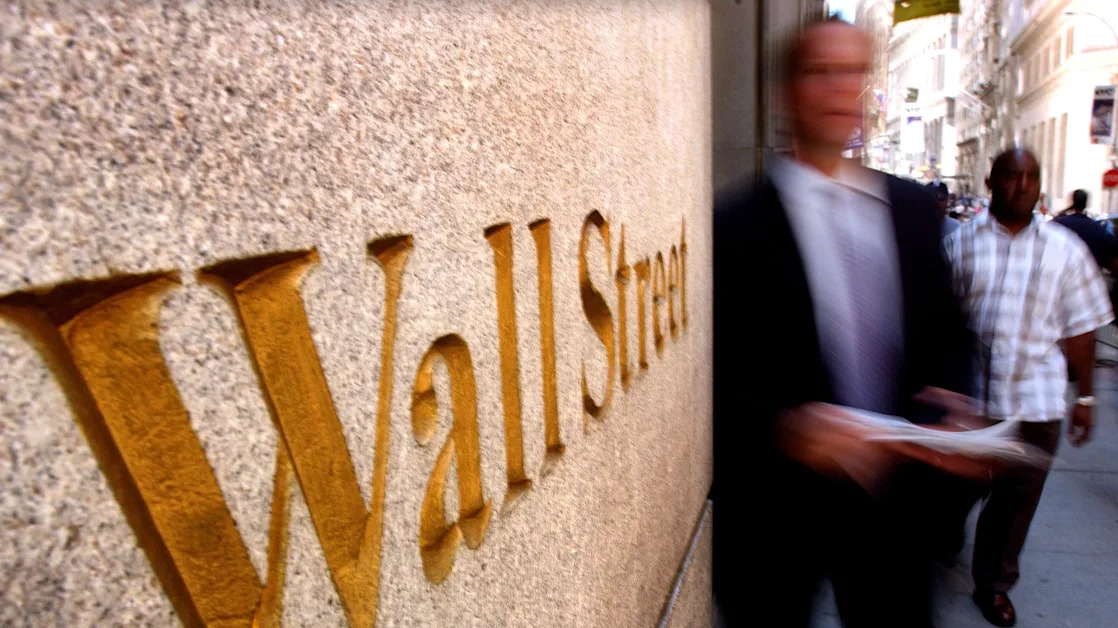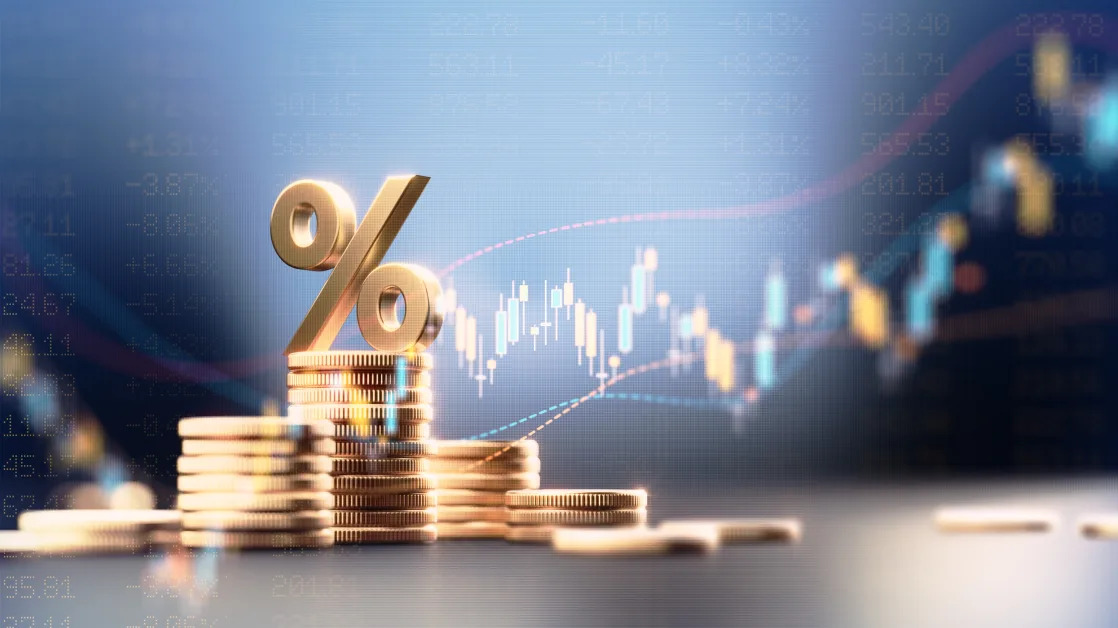Some relief is flowing through financial markets worldwide Tuesday as stocks bounce to recover a bit of their historic losses since President Donald Trump dramatically raised the stakes in his trade war last week.
The S&P 500 was up 3.7% in morning trading, though it still remains more than 14% below its record set in February . The Dow Jones Industrial Average was up 1,363 points, or 3.6%, as of 10:12 a.m. Eastern time, and the Nasdaq composite was 4.2% higher.
___
Here's the latest:
‘Magnificent Seven’ bounce back
The dominant group of U.S. stocks known as the “Magnificent Seven” is bouncing back, helping power the broad rally on Wall Street.
Chipmaker Nvidia and Tesla are leading the pack in midday trading with a gain of 5.5% and 5.4%, respectively. Microsoft, Apple, Amazon, Meta Platforms and Google parent Alphabet are all up between 3% and 2.1%.
The solid rebound comes a day after the a mixed finish for the group.
The “Magnificent Seven” are so massive in size, their movements carry more weight on the S&P 500 and other indexes than other stocks.
Health insurers jump on expected Medicare Advantage payment increase
Shares of major health insurers got a boost Tuesday after the federal government announced a better-than-expected 2026 payment increase for Medicare Advantage plans.
The Centers for Medicare and Medicaid Services said Monday after markets closed that final rates are expected to increase more than 5% in 2026.
The rate increase is expected to cost taxpayers an additional $25 billion next year, CMS said.
Medicare Advantage plans are privately-run versions of the government-funded Medicare program mostly for people who are 65 and older.
Shares of the two largest Medicare Advantage plan providers, UnitedHealth Group Inc. and Humana Inc., climbed about 7% and 10%, respectively, Tuesday morning. Elevance Health Inc. and Centene Corp. rose nearly 4% each.
The health sector was among the biggest gainers in a broader market turnaround Tuesday.
Chipmakers power broader market’s gains
Chipmakers are leading Wall Street higher.
Nvidia surged 5.3%, Broadcom jumped 7.6% and Advanced Micro Devices rose 3.5%. The companies and broader technology sector jumped amid hopes for negotiations over tariffs.
Chipmakers and other technology companies have an outsized impact on the broader market because of their pricey valuations. Big moves for the sector’s most valuable companies can swing the market on their own or accentuate an already sharp move.
Technology companies have seen their values skyrocket over hopes for artificial intelligence advancements. Higher costs for chips and other technologies pose a risk to that development and the earnings growth prospects for those companies.
US sees fewer visitors from overseas
Visits to the U.S. from overseas fell 11.6% in March compared to the same month last year, according to preliminary government data.
Tourism industry experts suspect foreign travelers have been angered by President Donald Trumps’ tariffs and rhetoric, and alarmed by reports of tourists getting arrested at the border.
The CEO of research institute that studies the preferences of Chinese tourists says leisure trips to places like Disneyland, Hawaii and New York are decreasing dramatically. He calls the trend the “Trump Slump.”
The Travel and Tourism Office data released Tuesday didn’t include arrivals from Canada or land crossings from Mexico. Industry analysts are expecting U.S. visits by Canadians to drop significantly.
Thailand to send delegation to Washington for tariff negotiations
Prime Minister Paetongtarn Shinawatra said Tuesday that Thailand intends to send a high-ranking delegation to Washington to negotiate with their U.S. counterparts over the new tariff policies.
Thailand is facing a 36% tariff under the new U.S. rules.
The decision to have a delegation led by Deputy Prime Minister and Finance Minister Pichai Chunhavajira was made after Paetongtarn held a meeting with her ministers of finance, foreign affairs an commerce, along with the Thai Trade Representative.
The Bangkok Post newspaper cited Pichai saying Thailand’s plans include revising its import duties and amending non-trade barriers.
Paetongtarn said the government had anticipated the issue and earlier this year established a U.S. Trade Policy Working Group to study developments and formulate a comprehensive response strategy. She said her government plans to roll out immediate relief for affected sectors, particularly small businesses and workers, while simultaneously crafting a broader economic overhaul to diversify export markets and boost national competitiveness.
Treasurys yields on the rise
Treasury yields are rising again in a potential signal that investors are gaining more confidence in the U.S. economy’s path ahead.
The gains could also signal that investors expect more inflation ahead. Treasurys, which are often viewed as less risky investments than stocks, have been volatile amid worries about tariffs and the economy.
The yield on the 10-year Treasury rose to 4.24%, up from 4.17% late Monday and from 4.01% on Friday. Banks use the yield on the 10-year Treasury as a guide to pricing home loans.
The 10-year Treasury is often considered a proxy for the direction of mortgage rates.
The yield on the 2-year Treasury rose to 3.83% from 3.76% late Monday and from 3.64% late Friday. It often follows traders’ expectations for the Federal Reserve’s moves with short-term rates.
EU and Chinese leaders talk on trade and bilateral relations
Chinese Premier Li Qiang on Tuesday spoke on the phone with EU Commission President Ursula von der Leyen saying China and Europe should boost communications, expand opening-up markets to each other and jointly defend free and open trade and investment.
Li defended China’s retaliatory measures to Trump’s tariffs as not only safeguarding China’s interests but also fighting for global trading rules. He said China and the EU can help provide “more stability and predictability” for each other and for the world, according to China’s official news agency Xinhua.
In the call, von der Leyen “underscored the vital importance of stability and predictability for the global economy,” according to the official readout on the phone call. She also stressed the responsibility of Europe and China, as two of the world’s largest markets, to support a strong reformed trading system, which should be “free, fair and founded on a level playing field.”
Global markets bounce back
The bounce back for global markets on Tuesday perhaps shouldn’t be a surprise. Stocks don’t go in one direction forever, and some of the best days in the market’s history have been clustered around some of its worst days.
The biggest gain for the S&P 500 since World War II was an 11.6% surge on Oct. 13, 2008, for example. That was during the depths of the Great Recession, when worries were high that the financial system was collapsing and the S&P 500 was in the midst of a nearly 57% plunge from its peak in late 2007 until its bottom in March 2009. A couple weeks later, the index had another one of its best days in history, soaring 10.8%.
That’s one of the reasons many financial advisers suggest not trying to time the market and selling stocks and other investments meant for the long term when nervous, because of the risk of missing out on such huge up days.
Small business optimism slips in March
Small business owners’ optimism slipped in March, as they dealt with looming tariffs and other new policies implemented by the Trump administration.
Optimism fell 3.3 points in March to 97.4, according to a poll by The National Federation of Independent Business, which is a widely used gauge of the economic health of small businesses.
The index fell slightly below the 51-year average of 98, following four months above the average.
“The implementation of new policy priorities has heightened the level of uncertainty among small business owners over the past few months.” said NFIB Chief Economist Bill Dunkelberg. “Small business owners have scaled back expectations on sales growth as they better understand how these rearrangements might impact them.”
The gold bounce
After hitting a new high last week, gold prices have tumbled following Trump’s “Liberation Day.” But futures bounced back some Tuesday morning.
The price of New York spot gold hit all-time record on April 2, per FactSet, closing at about $3,134 per Troy ounce — the standard for measuring precious metals — just before Trump unveiled his self-described “reciprocal” tariffs . Prices fell in the days following, closing at nearly $2,982 Monday.
A rebound could be ahead. Futures jumped up to over $3,032 Tuesday morning.Interest in buying gold typically spikes in times of uncertainty, as anxious investors seek a “safe haven” for parking their money. Many of Trump’s previously-imposed tariffs have helped fuel gold’s gains in recent months , even amid stock market turmoil. But precious metals are also volatile assets, so the future is never promised.
Levi Strauss says any price hikes to be ‘surgical’
Levi Strauss executives said on a conference call with investors late Monday said that any price increases it undertakes related to tariffs would be “surgical,” instead of broad-based.
Shares of Levi Strauss rose 9% in early trading after the jeans maker posted better first-quarter profit than Wall Street forecast and said it expected “minimal” impact from tariffs in the second quarter.
“Most of the product for spring, early summer is already in the U.S.,” said chief financial officer Harmit Singh.
Just how much President Donald Trump’s widespread tariffs would affect pricing has been a major concern for investors and analysts because tariffs generally act as a tax that gets passed on to consumers.
Levi earned 38 cents-per-share in the first quarter, easily topping the 28 cents-per-share that analysts forecast.
Tesla’s decline far outpaces S&P 500 average
Tesla stock market value has lost nearly $400 billion since the S&P 500 hit a peak on Feb. 19, a stunning 35% plunge. The index, by contrast, has fallen 17%.
Investors pushed Tesla stock to a record high after Donald Trump was elected on hopes Musk’s close ties would help the company. Instead, car buyers angry at Musk’s support for Trump and other right-wing politicians have boycotted his company.
A passing driver signals support to people protesting outside a Tesla dealership as part of a coordinated international day of “Tesla Takedown” protests, Saturday, March 29, 2025, in Miami. (AP Photo/Rebecca Blackwell)
A sharp decline Monday put Tesla’s stock at $233.29 and below its price on March 19, a key date. That is when Commerce Secretary Howard Lutnick made a surprising endorsement, urging Fox TV viewers to buy the stock in violation of a federal law banning government officials from endorsing companies.
Shares recovered somewhat in premarket trading Tuesday.
U.S. stocks gain in premarket trading
Futures for the S&P 500 gained 1.7% before the bell, while futures for the Dow Jones Industrial Average jumped 2.1%. Nasdaq futures climbed 1.5%.
Among the early gainers in premarket trading are Humana, up 14%, CVS, up 9.5%, and Norwegian Cruise Line Holdings, up 6.8%.
South African farmers say tariffs threaten 35,000 jobs in citrus sector
The Citrus Growers’ Association of Southern Africa say reciprocal tariffs will deeply damage to South Africa’s largest agricultural export.
The Association said Tuesday the tariffs - due to come into effect on Wednesday would threaten 35,000 jobs in the sector.
It said the tariffs would likely make South African citrus fruits cost $4.25 more per carton for American consumers.
Australian PM and opposition leader lock horns over who's best to deal with Trump
Australia’s prime minister and opposition leader have argued over who would best deal with U.S. President Donald Trump in the first debate ahead of federal elections on May 3.
Center-left Labor Party Prime Minister Anthony Albanese said the 10% tariff the United States imposed on Australian imports would pose a challenge but noted that “Australia got the best deal of any country on the planet.”
Conservative Liberal Party leader Peter Dutton said Australia negotiated a better deal during the first Trump administration, when it exempted Australian steel and aluminum imports from U.S. tariffs.
Dutton added that the prime minister “should have the ability and the strength of character to be able to stand up against bullies, against those who would seek to do us harm.”
Albanese said he would not allow the tariff dispute to disrupt Australia’s agreement with the United States and Britain that will deliver an Australian fleet of submarines powered by U.S. nuclear technology.
A second debate is on April 16.
Sri Lanka launches trade talks with US to ease tariff burden
Debt-stricken Sri Lanka says it has initiated trade talks with the U.S. to ease the new tariff hikes that could burden its already fragile economy.
Sri Lanka is struggling to emerge from a devastating economic crisis and a 44% tariff increase makes it among the worst-hit countries.
On Tuesday, Economic Development deputy minister Anil Jayantha told parliament that Sri Lanka government is in “continuous dialogue with the White House and U.S. trade representative office.”
The trade deficit favors Sri Lanka which exports nearly $ 3 billion-worth of goods to the U.S which only exports a tenth of that to the southeast Asian nation. Most of Sri Lanka’s exports include garments tea, fish and rubber.
Jayantha told parliament officials discussed “possible mitigation options to reduce this trade deficit” without giving further details.
Meanwhile, Sri Lankan president Anura Dissanayake has written a letter to president Donald Trump, “highlighting the possible ways of mitigating the things, action that we can take and requesting for collaboration to reduce tariff,” said Jayantha.
Indonesian president pledges to bolster economy to withstand US tariff
Indonesia’s President Prabowo Subianto vowed to build the country’s economy with the goal of standing on “our own feet” as his administration scrambles to contain market jitters following an American decision to impose a 32% import tariff on the country's goods.
He met investors, market players and economists in Jakarta on Tuesday to formulate how to strengthen Indonesia’s economic resilience.
“What is happening now, the world is in turmoil due to the world’s strongest economy country making policies to increase tariffs so high for many countries,” Subianto said in his opening speech at the meeting. He said the resulting uncertainty underlined the need to "rely more on ourselves to build our economy with our own feet.”
During the meeting, Chief Economic Minister Airlangga Hartarto emphasized that the Indonesian government will not take any retaliatory measures and has sent a request letter for negotiations on the reciprocal tariff policy through the United States Trade Representative the Secretary of Commerce.
“What America wants is a balancing of the trade balance,” Hartarto said, “We will increase our purchase of American products.”
World shares and U.S. futures advanced, led by gains in Tokyo
World shares and U.S. futures advanced Tuesday, led by gains in Tokyo where the Nikkei 225 shot up just over 6% as markets calmed somewhat. The modest rebound for most markets followed a wild day on Wall Street, where stocks careened after Trump threatened to crank his double-digit tariffs higher.
Germany’s DAX gained 0.9% to 19,975.81 while the CAC 40 in Paris was up 1.3% at 7,018.79. Britain’s FTSE 100 also picked up 1.3%, to 7,804.73.
The future for the S&P 500 gained 1.5% early Tuesday while that for the Dow Jones Industrial Average was up 1.9%.
In Tokyo, the Nikkei 225 closed a smidgen over 6% higher, at 33,012.58.
Hong Kong also recovered some lost ground, but nothing close to the 13.2% dive Monday that gave the Hang Seng its worst day since 1997, during the Asian financial crisis.
The Hang Seng gained 1% to 20,036.03. The Shanghai Composite index jumped 1.4% to 3,140.15 after the government investment fund Central Huijin directed state-owned companies to help support the market with share purchases.





